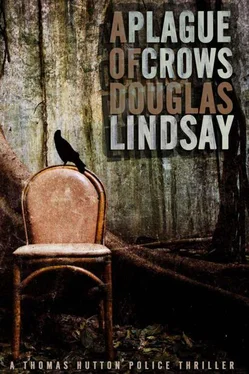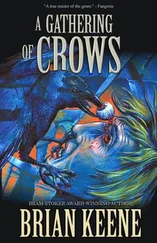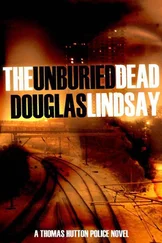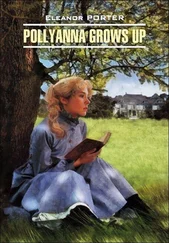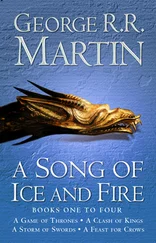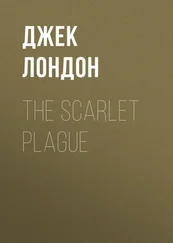Douglas Lindsay - A Plague Of Crows
Здесь есть возможность читать онлайн «Douglas Lindsay - A Plague Of Crows» весь текст электронной книги совершенно бесплатно (целиком полную версию без сокращений). В некоторых случаях можно слушать аудио, скачать через торрент в формате fb2 и присутствует краткое содержание. Жанр: Полицейский детектив, на английском языке. Описание произведения, (предисловие) а так же отзывы посетителей доступны на портале библиотеки ЛибКат.
- Название:A Plague Of Crows
- Автор:
- Жанр:
- Год:неизвестен
- ISBN:нет данных
- Рейтинг книги:5 / 5. Голосов: 1
-
Избранное:Добавить в избранное
- Отзывы:
-
Ваша оценка:
- 100
- 1
- 2
- 3
- 4
- 5
A Plague Of Crows: краткое содержание, описание и аннотация
Предлагаем к чтению аннотацию, описание, краткое содержание или предисловие (зависит от того, что написал сам автор книги «A Plague Of Crows»). Если вы не нашли необходимую информацию о книге — напишите в комментариях, мы постараемся отыскать её.
A Plague Of Crows — читать онлайн бесплатно полную книгу (весь текст) целиком
Ниже представлен текст книги, разбитый по страницам. Система сохранения места последней прочитанной страницы, позволяет с удобством читать онлайн бесплатно книгу «A Plague Of Crows», без необходимости каждый раз заново искать на чём Вы остановились. Поставьте закладку, и сможете в любой момент перейти на страницу, на которой закончили чтение.
Интервал:
Закладка:
'Seen worse,' I say.
It sounds Python-esque, but fuck it, I'm not lying. I have. I have seen worse. For all my guilt, I haven't done worse, but I've seen it. I've taken the photographs and I've sent them back to London newspaper picture editors, and they've said, you are fucking kidding me, we're not printing that…
'Seen worse,' I repeat, and my head drops.
45
She arrives first. Sits and waits. The house is dark.
She isn't usually so unsure of herself, but this is different. This is the Plague of Crows. Gostkowski is convinced. It's based on nothing more than a coincidence, because why couldn't Clayton's ex-sister-in-law be working as a waitress on the other side of Glasgow? But she knows, absolutely and without doubt.
She'd called it in; hadn't bothered going to anyone other than Taylor. The sister-in-law who worked at the café across the road. First thing he did was run over there to see if there was anyone who met the description. Then he was back and tracking her down. Jane Kettering poured out of distant police files in great torrents of disaffection. From an early age. He cursed that they had given up on the search when they had. Even just a couple of more hours of Gostkowski's investigation and she could have tracked her down.
There was an address, in the hills behind Gourock. Gostkowski was closer. He'd told her to wait for him. As he'd said it she doubted that she would, but now that she's here she hesitates. Turns off the engine and the lights, finds herself making sure the car doors are locked. Sudden fear. Where has that come from?
Five minutes pass. She wonders if she should go in. Starting to steel herself. Starting to prepare for it. Seven-and-a-half minutes and Taylor arrives. She hasn't moved.
She gets out her car as Taylor pulls up.
'Where are the others?' she asks, as Taylor walks quickly towards her.
'It wasn't enough,' he says.
That's all that is needed.
Gostkowski hadn't had much to tell him. A face in a photograph, Clayton's former sister-in-law in a café paying attention to her and Hutton. Now Hutton is missing.
Six months ago it might have been enough, but now there have been too many mistakes, too many conclusions jumped to that have not been proven. More than anything, Taylor has been working on this since the previous summer and has got nowhere in all that time. To believe that he's gone from nowhere to identifying where the killer lives in a matter of minutes seems preposterous. Neither does the connection to Clayton help. To anyone else it is going to seem like another plan from Clayton to fool the police. Only Gostkowski, who has been there, who worked it out for herself, knows that it isn't.
Perhaps there are doubts lingering, too deep yet to come to the surface.
They approach the door, ring the bell. A detached house, not too large, a small front garden. Taylor turns and looks across the road and around at the neighbour's homes while they wait. Quiet Scottish suburbia. The kind of place where the police would get called out to adjudicate over a hedge dispute or to answer a complaint about someone parking their car in front of someone else's house.
He steps away from the front door to take a broader view of the house, bathed in the orange glow of the street lamps. A few bare trees in the front garden lessen the effect of the lights.
'Open the door,' he says.
Gostkowski first of all tries the handle, then finding it locked looks around the garden. There are stones lining the border between the lawn and the path and she lifts one of them and quickly puts in the glass panel on the door closest to the lock. Reaches round, key in the lock, which is all just marginally less difficult than the door being open in the first place.
They enter quickly, Taylor moving in front, close the door and turn on the light. A regulation hall, stairs leading up ahead of them, door to the left and right, another door at the end of the hall beside the cupboard beneath the stairs.
Silence.
'What was it that was suspicious about her in the café?' asks Taylor.
Gostkowski pictures the woman chatting to them.
'Nothing,' she says.
Taylor nods.
'Good. It's good that you didn't miss anything previously.'
All the doors are closed. The floors are wood, a long rug from the Middle East lines the hallway leading to the kitchen. The walls are magnolia, hung with three or four original watercolours. Pastels. Sea and sand and old harbours.
'Nice place for a waitress,' he says.
Hutton had thought the same thing, but he had parked the thought. Sex first, plenty of time to ask questions later.
'Don't like this,' says Taylor. Not used to working with women. 'Stick together.'
Gostkowski doesn't know that he and Hutton would have split up.
When he starts moving he does it boldly and confidently. Having established his bearings he is not about to creep around.
First room, on the left; a study, generally used as a dumping ground for unneeded things. There's a baby grand piano, cluttered and unused.
Second room, on the right. Sitting room. Television. Photographs of the same two children, and of a similar vintage, that Clayton has in his house. Taylor scans the room, takes everything in, turns and walks out. Down the hall, stops to open the door under the stairs. The cupboard has been converted into a very small bathroom. He looks at the floor, wonders if this is where there would be a trap door to the basement. On first inspection it is tiled and solid. He will come back later if he finds nothing else.
Into the kitchen. Light on. Modern, redesigned and fitted some time in the previous two or three years. Nothing obvious. This person lives alone with no reason to assume that the house is about to be infiltrated. There's no reason why she would have to keep secrets hidden.
Taylor walks out, back down the hall. Gostkowski hesitates a little longer in the kitchen, then follows. Up the stairs. A door straight in front of them, slightly open. Taylor walks right in. A spare room. A single bed. Everything very neat. He quickly notices the film of dust. There is a sadness and an emptiness about the room. Something about it, so great, that there almost seems a physical manifestation of the emptiness. A spare room that is never used because there are no visitors.
Perhaps there is something more fundamentally amiss with the room than that. Gostkowski shivers. They walk out. Quick look in the bathroom, nothing to see. They can rake through the cabinets later. Another door beyond that, another bedroom. The double bed has been made, there is order. There is no sign that this was where Hutton lay back, where Hutton was euphoric, where Hutton was so brutally immobilized.
Taylor turns, walks back past Gostowski along the corridor to the final door. She follows.
The third bedroom, but this one a bedroom transformed. All traces of the room's original use have been removed. Here is a large desk in the middle of the floor, the walls have been stripped and hung with maps and lists of names. Photographs are everywhere.
They both feel the jump of nerves. Taylor steps forward.
'Call it in,' he says.
Gostkowski doesn't move. Looks around the room. The wolf's lair. The operations centre, almost as if it had been laid out for them. Photographs of some of the previous victims on the wall. A large map of Scotland, pins inserted in various places around the central belt. Satellite images of woods. The desk is littered with paperwork, which Taylor is already looking through.
He notices the silence and turns.
'Inspector?'
'How do we know?' she says.
'What?'
'How do we know it's not a set-up?' she says. 'This is perfect. It's too perfect. I see the photograph in Clayton's house, and now we're here. He might as well have told me where to look, and now we pitch up and we find this. All the evidence we'd ever need, right there in front of us.'
Читать дальшеИнтервал:
Закладка:
Похожие книги на «A Plague Of Crows»
Представляем Вашему вниманию похожие книги на «A Plague Of Crows» списком для выбора. Мы отобрали схожую по названию и смыслу литературу в надежде предоставить читателям больше вариантов отыскать новые, интересные, ещё непрочитанные произведения.
Обсуждение, отзывы о книге «A Plague Of Crows» и просто собственные мнения читателей. Оставьте ваши комментарии, напишите, что Вы думаете о произведении, его смысле или главных героях. Укажите что конкретно понравилось, а что нет, и почему Вы так считаете.
